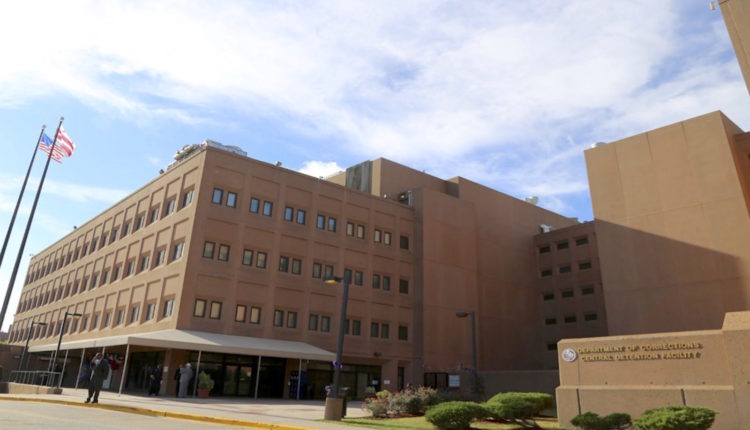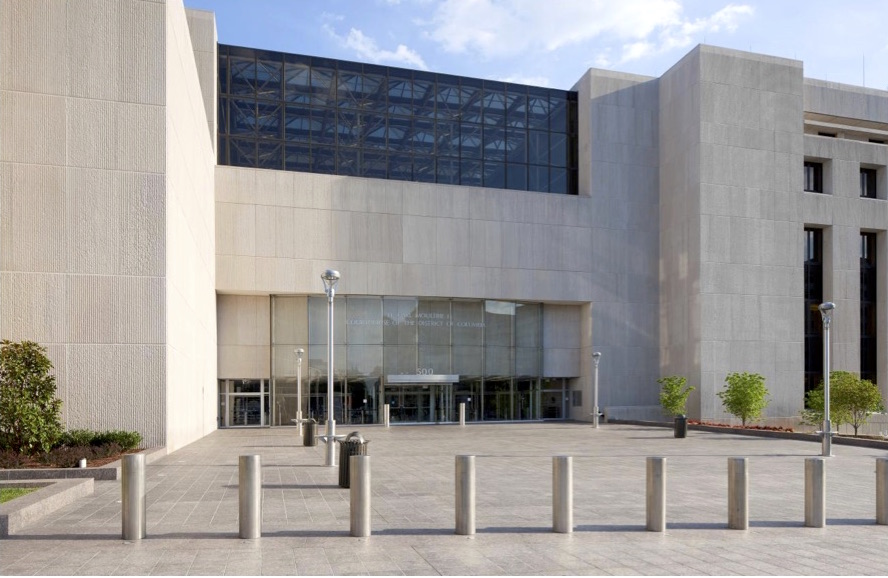
DC activists raise the alarm about the danger of a COVID-19 outbreak among detained people
On March 14, nearly two months after the first reported case of the new coronavirus in the United States, activist Taylar Nuevelle went to the DC Superior Court to watch room C-10. There, new detainees are processed after being arrested by DC’s Metropolitan Police Department. Nuevelle, an advocate for the rights of incarcerated people, went to see whether the Superior Court’s staff and the law enforcement officers who work there were following the U.S. Centers for Disease Control’s recommendations for preventing the spread of the virus.
What she saw and heard disturbed her: business as usual.
Detainees were “in close proximity and they’re being touched by marshals who wear permanent gloves to protect themselves,” Nuevelle said. She also observed court personnel taking restraints off one person and putting them on another without first sanitizing them.
Safety conditions within the DC Department of Corrections (DOC) have long been an issue, from insect and vermin infestation to a detainee recently dying while in custody. “It’s a hotbed of infection on any given day,” said Nuevelle, who became an activist after enduring her own experience in jail. The coronavirus outbreak has unleashed a new level of concern for the safety of detainees.

Nuevelle spoke to a few newly released people as they left the courthouse. They said that DC’s Central Cell Block — located in the basement of the MPD building next to the courthouse and used to hold arrested people while awaiting initial court hearings — was not giving soap to arrestees, and that detained people were getting their water from a spigot above a communal toilet.
Nuevelle put together a letter to the DOC, the DC Superior Court, the DC Council and Mayor Muriel Bowser calling for Central Cell Block and the lockup at DC Superior Court to apply CDC prevention guidelines. So far 24 community organizations have signed on, including the Gertrude Stein Democratic Club, Witness to Mass Incarceration and Black Women Radicals.
Specifically, the letter demands basic sanitation supplies for everyone in DOC custody and Superior Court lockup, a switch to disposable gloves and disposable handcuffs for U.S. Marshals Service employees and security officers working at the court, and hourly disinfections of cells. The signatories also asked the DOC and Superior Court to post their COVID-19 protocols online.
In response to the kind of issues identified in the letter, DC Del. Eleanor Holmes Norton on Sunday asked officials at the court and Marshals Service to review their current practices and “take steps to reduce the risk of transmission of the coronavirus.”
Neuvelle was already working on the letter when it was reported that a member of the U.S. Marshals Service who works at DC Superior Court had tested positive for the coronavirus.
The marshal was tested in response to flu-like symptoms. He last worked in room C-10 the day before Nuevelle did her court watch earlier this month.
As many as 20 to 100 people are processed through C-10 each day. Depending on the type of case, detainees are typically either locked up in the DC Jail in close proximity with others or sent home. Meanwhile, 20% of people booked into DC Jail have short-term stays of a week or less, contributing to a high turnover of people passing through the crowded facility and then returning to the community, according to the Washington Lawyers’ Committee for Civil Rights and Urban Affairs.
The U.S. marshals transport detainees to and from hearings, trials and other appointments at DC Superior Court. The marshals’ role in DC courts is a quirk of the District’s unique system: In most of the country, court security and detainee transportation are managed by local agencies. The U.S. Marshals Service did not respond to an inquiry as to whether other marshals who came into contact with detainees have tested positive for coronavirus, but The Washington Post reported March 22 that two security officers working at DC Superior Court had tested positive.
In a general statement, the Marshals Service said that it does not “own or operate detention facilities” itself, instead partnering with local or state agencies to house prisoners. DC’s Department of Corrections did not respond to phone calls or emails requesting comment.
Two members of MPD have also tested positive for the virus: a homicide detective and a second employee.
The Marshall Project, a nonprofit news outlet covering criminal justice, reported last week that two MPD officers had interacted with a woman who claimed to have been exposed to coronavirus. The officers were not isolated. In the article, the chair of the DC police union said that the officers were “going to come to work” as long as they didn’t show flu-like symptoms. According to the Mayo Clinic, some people infected with coronavirus show no symptoms.
The Washington City Paper reported that a detainee at the DC Jail in Southeast was placed in quarantine on March 17. That inmate tested negative for coronavirus, but several others remain in quarantine in a separate cell block, according to information at the mayor’s March 23 press briefing
Meanwhile, the union representing D.C. Jail corrections officers sent a letter to DOC director Quincy Booth calling for more protective equipment, support from medical professionals and the dismissal of the warden from his position. First reported by The Washington Times, the union’s vote of “no confidence” came in the wake of an incident in which corrections officers were instructed to quarantine detainees without the protective equipment the officers had requested.
Concerns about the risk of coronavirus infection in the DC Jail led defense attorney James Zeigler to ask a judge to release one of his clients. His client is stuck in DOC custody and the case has been delayed until May.
“These are huge facilities with people in close quarters,” Zeigler said in an interview with The DC Line. “In addition to that internal churn, you have high traffic in and out — both employees and inmates. … The appropriate response is getting as many people out of jail as you safely can.”
Zeigler and others have expressed their concerns on social media.
“I’ll keep repeating it until DC has large scale decarceration,” Alison Horn, an investigator with the Civil Rights Corps, tweeted Monday in response to reports of a growing number of confirmed cases at New York City’s main jail complex. “We can prevent our DOC from becoming Rikers. We can save lives inside and outside of our jails. This is urgent. We can’t wait until we have confirmed cases at the jail to release people. We must act now.”
Through the weekend of March 14 and 15, MPD was still arresting people for low-level offenses, including selling marijuana, driving without a license and failure to appear in court, according to the news outlet The Appeal.
At a March 13 meeting, court administrators, U.S. marshals and MPD officials discussed leaning more heavily on citations to reduce the number of arrests and reduce congestion in the Central Cell Block and DC Jail. On March 16, the chief judge of DC Superior Court issued an order “enabling law enforcement to release an individual not otherwise eligible for release … upon approval of the prosecuting authority” in order to prevent “high numbers of custodial arrests.”
MPD issued an executive order on March 17 saying that arrestees are generally eligible for citation release unless they’re being charged with certain serious offenses like homicide, indecent conduct with a minor, or domestic violence. The order also says that officers cannot charge arrestees bond, although a judge could do so as part of a warrant or court order.
When the DC Council approved emergency legislation last week in response to the COVID-19 crisis, legislators authorized expanded issuance of “good-time credits” to catalyze the release of people charged with misdemeanors. Inmates who earn good-time credits by participating in work details, special projects or rehabilitative programs can shave time off their sentences.
In addition, DC Superior Court’s Criminal Division issued an order on Sunday laying out a list of requirements for those requesting relief from detention due to the pandemic.
At a March 24 press briefing, Deputy Mayor Kevin Donahue said that detainee inflow into Central Cell Block had decreased by 40%.
Notwithstanding the announced policy changes, on Saturday at the DC Superior Court detainees charged with simple assaults and misdemeanor threats were still being brought in to appear before a judge. Those who were allowed to leave the courtroom said that they had not received soap or hand sanitizer while in custody. At least one Superior Court security officer wore non-disposable gloves. A member of the U.S. Marshals Service was overheard saying that one of the detainees was “spitting on everybody.”
Meanwhile, at least one suburban jurisdiction is taking dramatic steps to reduce the jail populations. In nearby Prince George’s County, 50 detainees have been released thus far from the jail due to coronavirus concerns. All of those released had been arrested on non-violent charges. In an email exchange with The DC Line, the Arlington County Sheriff’s office said they were “looking into all options as the situation continues to evolve” when asked whether they would consider releasing detainees.
At a press conference last week, DC’s mayor said she would not consider releasing any detainees from DOC custody. Bowser was asked, “Are you considering any action for releasing certain populations of inmates from the jail?” Flanked by the DC police chief, she responded, “No.” The reporter followed up by asking, “None at all?” The mayor replied, “I answered you.”
Ziegler said that if there’s a coronavirus outbreak in the jail, “maybe that changes the calculus.”
“Maybe not,” he added.


Comments are closed.